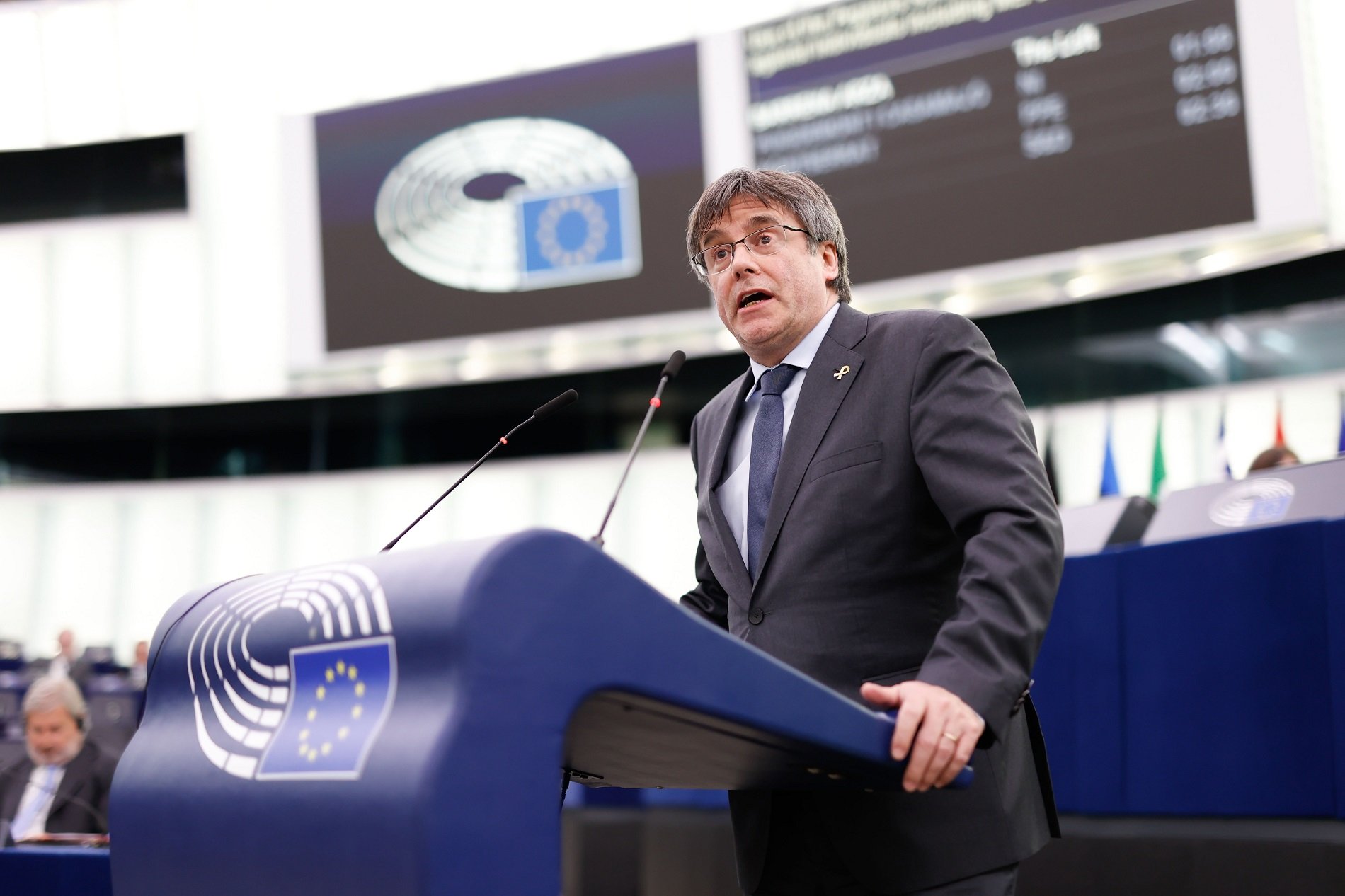If it is clear that Europe faces a serious threat from autocracies beyond its borders, what about the European countries that also undermine democracy within the EU? That was the question which Catalan MEP Carles Puigdemont put directly to the president of the European Commission, Ursula Von der Leyen, this Wednesday, in the debate on the state of the European Union in Strasbourg. The MEP alluded to the words of the president when she had affirmed earlier that a struggle between democracy and autocracy is underway, that "this is the real battle", and that furthermore "democracy must be renewed ". In response, Puigdemont noted that while there are indeed grave threats from outside, "unfortunately you have forgotten the internal threats", she put to Von der Leyen. Puigdemont criticised the president who "at no time has she reminded us that democracy must not spy on its citizens, on politicians, journalists, activists, as happens in, among other places, the Spanish state".
Puigdemont also affirmed that the rulings of the European Court of Human Rights must be respected, but then recalled that "61% of these rulings have not been respected in Spain". Puigdemont claimed that authoritarianism must be fought, but he noted that this must also be done by strengthening democracy from within, he protested, noting that "it is not at all easy when commissioners pose for pictures with the extreme right and refuse to be interviewed with MEPs who have been spied on".
The Catalan MEPs criticized the president of the European Commission for the lack of response from the Union's executive and the rest of the European institutions in relation to the Catalangate espionage affair. For his part, European representative for ERC, Jordi Solé, demanded "bravery" from the president of the Commission in the defence of fundamental rights in the European Union. Solé also stressed that the values of the European Union within member states "cannot be taken for granted". "Here, too, it is necessary to defend fundamental rights every day; in some countries we have been spied on through mobile phones, as has happened to me, and this is a problem," he said, speaking to his fellow MEPs in English (see speech below).
👉A la UE no totes les amenaces a la democràcia venen de fora. Quan en alguns estats membre ens espien piratejant els nostres telèfons, tenim un problema.
— Jordi Solé🎗🇪🇺 (@jordisolef) September 14, 2022
🗣Li demano més coratge per defensar la democràcia i els nostres drets fonamentals, Sra. @vonderleyen pic.twitter.com/cSc3gELfIR
The EU, threatened from within
Earlier this week, Puigdemont had already raised the case in which Pegasus spyware has been employed against dozens of pro-independence Catalans when he spoke in the European Parliament debate on espionage in Greece and urged the community authorities to "react" to the events in both countries. "If we do not react to Pegasus, we will find that under the pretext of national security, legal certainty will end and, as a result, our democracy will be weakened," he warned on Monday, this time speaking English to the chamber (see speech below). On that occasion, the Commission gave support to Puigdemont's argument. The European Commissioner for justice, Didier Reynders, asked the authorities and courts of the member states to "use all powers" to investigate cases of espionage with the Israeli software. In addition, the Commissioner reiterated the principle that communications can only be intercepted when "national security is at risk." And he went further on this point: "The simple reference to national security is not enough." "It must be based on specific and important elements", he specified, while he reiterated that the 27 must "supervise and control their security systems and services so that they fully respect European legislation".
Els valors democràtics de la Unió Europea estan amenaçats des de dins. Si no reaccionem amb #Pegasus, ens trobarem que sota l'excusa de la seguretat nacional s'acabarà la seguretat jurídica i, com a conseqüència, la nostra democràcia es veurà debilitada https://t.co/lEhieUIYMP pic.twitter.com/pLI8HGbS79
— krls.eth / Carles Puigdemont (@KRLS) September 12, 2022
In the debate this Wednesday, the rule of law was the main topic discussed by the political parties. One of the most forceful was the spokesperson for the Socialists and Democrats group, Iratxe García, who pointed out that the state of European democracy "seems as fragile as the economy". "Some member states such as Hungary have become autocracies, while fascist parties are gaining strength in Italy; it is worrying," she said. In this regard, García accused the attitude of some parties of "normalizing" the entry of the extreme right into the institutions and asked them to rectify this. However, even she did not mention the practices of her own country, Spain, that raise doubts about the rule of law.
In fact, this Wednesday the European Parliament will also be debating the compliance with European values in Hungary. In relation to this issue, the spokesperson of the Renew Europe group, Stéphane Séjourné, asserted that the European Union "made a mistake" by allowing it to enter the European club and added that "not one more cent can be given" to the Hungarian prime minister, Viktor Orbán.

